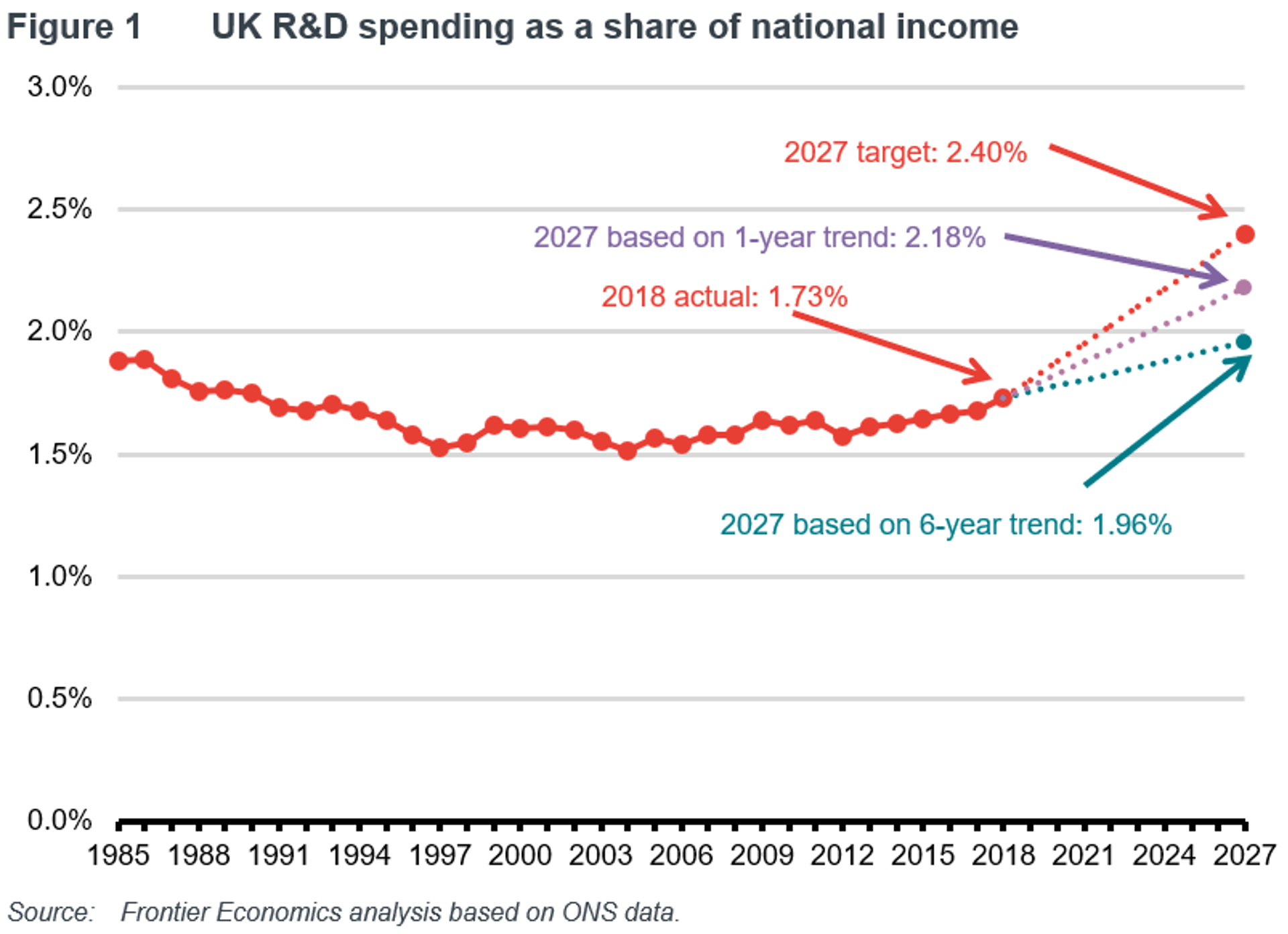Since the 2008 financial crisis, innovation has been a central feature in the quest to tackle sluggish UK productivity. But what happens to innovation in a pandemic? And should we change our thinking about how to promote it? We take a look at the impact of Covid-19 on business innovation – and suggest four key ways policymakers should respond.
Innovation policy pre-Covid
As a major driver of growth and productivity, the case for public investment in research and development is clear. Private returns come in the form of increased profit, and wider returns to society are thought to be two or three times larger.
The UK Government has therefore taken significant policy steps to support innovation in recent years, including:
- The 2017 Industrial Strategy White Paper, setting out a policy framework within the renamed Department for Business, Energy and Industrial Strategy.
- The Industrial Strategy Council, an independent body set up in 2018.
- The creation of UK Research and Innovation (UKRI) in 2018, bringing the Research Councils, Innovate UK and Research England into a unified body.
These structural changes have been supported by greater funding, too. The 2020 Spring Budget committed to doubling annual public R&D investment to £22 billion by 2024/25 – in support of a wider target to raise total investment to 2.4% of national income by 2027, up from 1.7% today.
If reached, that target would represent a significant step-change for the UK, as the chart below shows.

Achieving 2.4% will require not only increased public spending, but further investment from the private sector too – which, at £26 billion in 2018, is already more than double that of the public sector.
This means the implications of Covid-19 for business investment – including in R&D and other drivers of innovation – will be critical.
What do we know about Covid-19 and innovation?
As research has shown, recessions substantially reduce the share of firms willing to invest in innovation.
And those that do increase their investments look very different to the typical profile of ‘innovative firms’ in more normal times – they tend to be younger, smaller, and more likely to engage in collaborative innovation activity.
But Covid-19 is not a ‘typical’ recession – in its origins, depth and distributional impact across sectors. So in what ways has its impact on innovation differed?
For one, the pandemic has actually forced businesses to innovate: employees have had to work remotely, and business models, processes and supply chains have had to transform at great speed.
In some cases, firms have adapted production to meet changing consumer needs – switching from distilling gin to making hand sanitiser, for example.
But these are temporary phenomena, occurring in response to an immediate threat. As the pandemic enters a new phase, businesses are starting to ask themselves important questions about its longer-term impact on innovation:
- What type of innovation do we want? ‘Big bets’ with potentially large payoffs, or slower, more incremental change?
- What incentives do we have to innovate in this new economic landscape?
- How do we progress with innovative projects? What evidence do we need to support investments, and do we need to change our processes?
- Do we go it alone, or do we need to collaborate with others to drive innovation?
The answers to these questions will depend, to a large extent, on government policy.
The role of policy in supporting innovation
A key player in government policy to support innovation is UKRI. In 2019/20, UKRI invested £6.8 billion in research and innovation grants supporting almost 4,000 separate organisations. Other investments supporting innovation include capital infrastructure, support for networking and collaboration, support for knowledge transfer and loans.
The public sector more widely supports innovation through direct funding from other government departments, and through the tax system. In 2019/20, the estimated cost of tax reliefs for R&D were around £4.8 billion. Research suggests that £1 of R&D tax relief generates between £1.53 and £2.35 of additional R&D.
Covid-19 has forced a rapid response from government in its innovation support. New funding mechanisms have been established and grants and payment flexibilities offered to those with current projects. Recent estimates suggest that UKRI funding for Covid-related projects so far amounts to more than £185 million. More broadly, research across government has been re-focused on the response to the pandemic.
The business response to these opportunities has been significant, and the evidence suggests that many of those applying for new funding do not have previous experience of receiving public support for innovation. This suggests more firms are thinking about innovation as a key enabler for resilience and growth, helping to mitigate some of the negative impacts of the crisis. What’s more, a large proportion of applicants are small enterprises, highlighting an increased appetite for innovation in such firms as a result of Covid-19.
The four main policy implications
So, given what we know about Covid’s impact, and the way that policy has started to adapt, how should government support business innovation in response to the pandemic?
We believe there are four main areas for policy to focus on:
- Adapt to support different types of innovation and different types of businesses.
Many firms are focusing on innovation for the first time as a result of the pandemic. And even those with a track record of innovation investment may now be focusing it on new areas of their business.
In response, policy should address organisational barriers that prevent firms diffusing innovative ideas. For example, a lack of capacity to develop new processes for innovation could be overcome through both funding and mentoring schemes.
- Enhance incentives to innovate.
Public policy must ensure that businesses continue to prioritise innovation, particularly in the case of more risky ‘big bets’, which have transformative potential.
Significant public resources are already being invested in longer-term innovation programmes, like Challenge Funds. Firms reaching out to Innovate UK or other public funders for Covid-related support must be made aware of these programmes.
And the more aware the private sector is that large-scale public investment is taking place, the more likely private investors will be to back riskier big bets.
- Support collaboration.
As in previous crises, Covid-19 may lead some firms to look at collaborative innovation, particularly for larger investments where risk-sharing would be attractive.
Much public research and innovation investment is already collaborative by design. But government can help ensure the right networking and communication strategies are in place to allow new, fruitful partnerships to form – and that they include private investors, where appropriate.
- Adapt the way innovation policies are evaluated.
Some of the measures commonly used to assess the impact of innovation support – job creation, business turnover, patents registered – will not be as relevant to the specific aims of Covid-related support.
Evaluation should focus instead on whether support has helped viable firms retain jobs and investments that might otherwise have been lost, and if it has brought new firms into the wider innovation ecosystem.
But this won’t be easy. In the face of such an uncertain landscape, isolating the effect of the policy on business outcomes will be even more challenging than usual, placing greater emphasis on using a mixture of data and methods to provide evidence of effectiveness.




